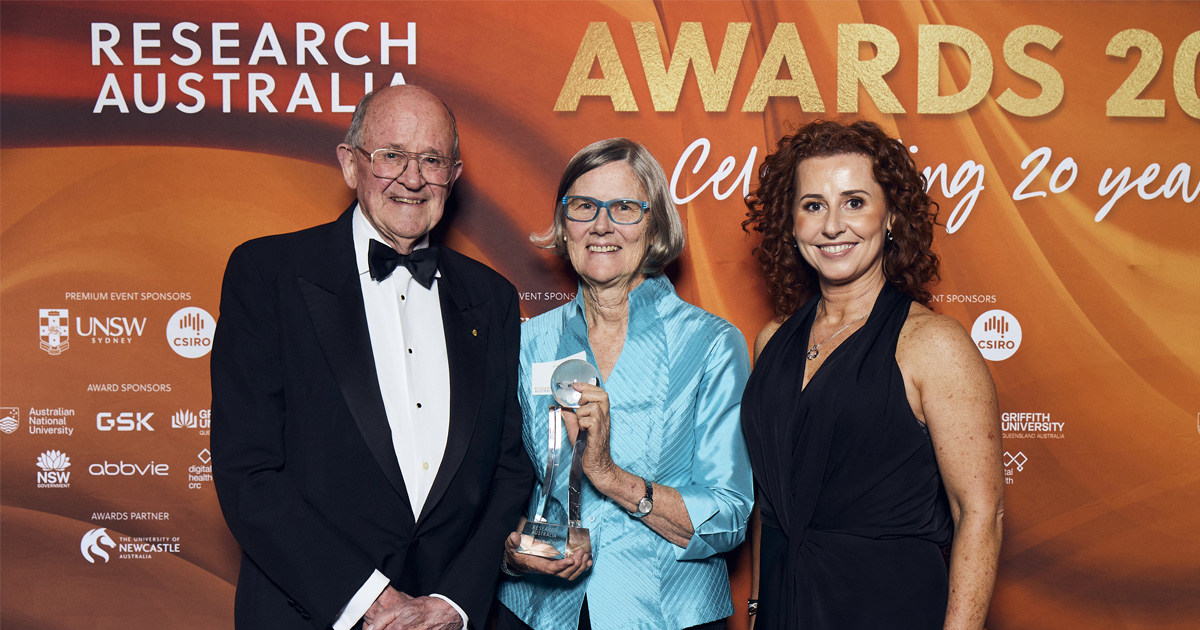
Pictured: Peter Wills AC, Carol Bower, and Nadia Levin. Photography credit: Research Australia
One of The Kids Research Institute Australia’s most influential researchers, who has played a seminal role in birth defect research and advocacy over a four-decade career, has won the Peter Wills Medal – the Australian research community’s flagship award.
Emeritus Professor Carol Bower AC, internationally renowned for her landmark research and tireless efforts to ensure her findings were translated into real change, was awarded the Medal by Australia’s Chief Scientist Dr Cathy Foley and Research Australia Founder Peter Wills AC at the 2023 Research Australia Health and Medical Research Awards.
The awards, in their 20th year and presented during a gala dinner in Sydney, celebrate the nation’s top medical researchers and the philanthropists and advocates who support them to improve health outcomes and change lives.
The Peter Wills Medal recognises someone who has made an outstanding, long-term contribution to building Australia’s international reputation in health and medical research, as well as fostering collaboration for better health.
One of the world’s top epidemiologists in her field, Emeritus Professor Bower devoted her career to providing population-based evidence for the prevention, diagnosis and management of birth defects including neural tube defects (NTDs) and Fetal Alcohol Spectrum Disorder (FASD), and the development and evaluation of policy and practice.
In one of her best-known achievements, early in her career Emeritus Professor Bower confirmed the link between low dietary folate and NTDs. In addition to promoting periconceptional folic acid supplement use, she spent the next 20 years advocating for fortification of wheat flour in Australia – a measure finally introduced in 2009.
Following rigorous evaluation of the move’s health impacts she was able to demonstrate that the initiative – described in 2018 by the Public Health Association of Australia as one of the top 10 public health achievements of the past two decades – had resulted in dramatic reductions in NTDs, most notably in Aboriginal communities.
In other trailblazing work, Emeritus Professor Bower established Australia’s first birth defects registry and significantly developed the evidence base and diagnostic tools for FASD.
The Kids Research Institute Australia Executive Director Professor Jonathan Carapetis AM said Emeritus Professor Bower – who, together with Professor Fiona Stanley AC, helped establish the Institute in 1990 – was not only a highly intelligent, hard-working scientist and mentor, but a much loved and respected member of the The Kids family.
“Carol’s history with The Kids Research Institute Australia goes back to its earliest days, when she and five other foundational researchers including Fiona started what is now one of Australia’s largest, most successful medical research institutes,” Professor Carapetis said.
“She has been a modest yet deeply influential presence throughout her four decades with us, both through her research and her pioneering dedication to community engagement in research.
“Even though she has now retired, her work continues to have significant impact, especially through the internationally unique databases she established and ran for decades. These large, high-quality data sets continue to inform research here and around the world.”
Professor Carapetis said one of Emeritus Professor Bower’s key legacies was her deep commitment to ensuring research involves and benefits the wider community.
“Over and again this commitment has driven translation of scientific findings into real change,” he said.
“The folate story is a marvellous example of Carol’s tenacity and patience, but she has been equally persistent around alcohol-related harm, including successfully lobbying with others for mandatory pregnancy warning labels on alcohol packaging.”
Among other alcohol-related harm research, Emeritus Professor Bower led the team behind the ground-breaking Banksia Hill Study which found 89 per cent of detainees at Banksia Hill Youth Detention Centre had undiagnosed severe neurodevelopmental impairment, including 36 per cent with FASD.
Emeritus Professor Bower said she was honoured to receive the 2023 Peter Wills Medal, along with recognition of the importance of birth defects research and prevention.
“This research has been based on solid epidemiological principles to produce rigorous evidence, with which we have then been able to advocate for and evaluate the effects of change,” Emeritus Professor Bower said.
“I’m so grateful to the many people and organisations who have been willing to contribute to this long journey.”
Immunisation champion also recognised
Also at the Research Australia Awards, leading consumer advocate Catherine Hughes – who started the Light for Riley campaign after losing her four-week-old son, Riley, to whooping cough in 2015 – was Highly Commended in the Advocacy Award category for her tireless work promoting the importance of immunisation and infectious diseases research.
The campaign – begun within days of Riley’s death to shine a light on the dangers of whooping cough and importance of pertussis vaccination during pregnancy – not only led to rapid policy change but significantly boosted whooping cough awareness and has helped ensure Australia now has among the world’s highest rates for pertussis vaccination in pregnancy.
Mrs Hughes’ advocacy has since expanded to other vaccine-preventable disease including flu, RSV, meningococcal and pneumococcal, with the Hughes family establishing the Immunisation Foundation of Australia to provide evidence-backed resources and inspire community-based advocacy.
Also recognised at the awards was The Kids Research Institute Australia honorary researcher Dr Noula Gibson, who was a finalist for the Health Services Award in recognition of her internationally renowned contributions to cerebral palsy research.
Dr Gibson – a senior physiotherapist and research co-ordinator within the Physiotherapy department at Perth Children’s Hospital, an Honorary Research Associate with the Child Disability research team at The Kids and an adjunct research fellow for the Curtin School of Allied Health at Curtin University – has been instrumental in improving the management and quality of life of children with cerebral palsy and other neurological conditions, enhancing physical activity and participation and helping to prevent life-limiting disease.
